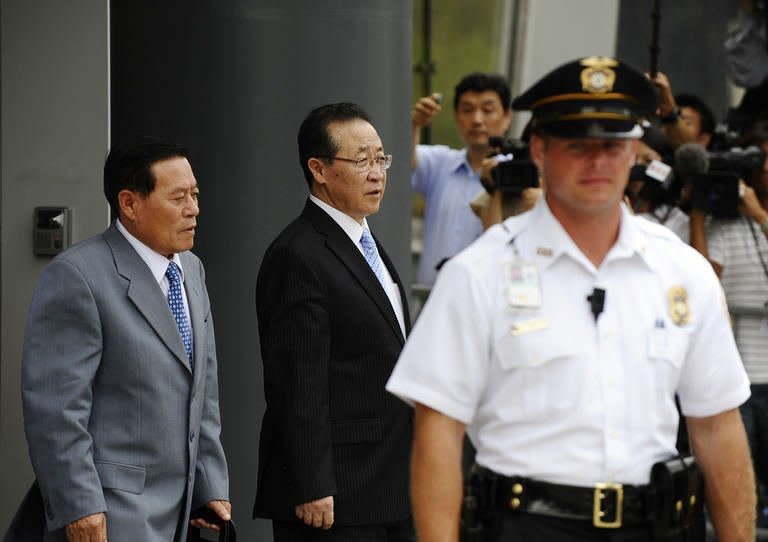US presses N. Korea for 'irreversible' disarmament move
The United States on Thursday pressed North Korea to take "concrete and irreversible" steps to give up its nuclear arsenal at talks on how to improve hostile relations. The US State Department said the first day of the talks in New York had been "serious and businesslike". North Korea's representative also called the atmosphere "constructive". While the United States has stressed that North Korea must make moves to scrap its nuclear weapons if six decades of tensions are to be ended, it was not clear if North Korea had made any specific demands. The US special envoy on North Korea, Stephen Bosworth, and the North's first vice foreign minister Kim Kye-Gwan held about four-and-a-half hours of talks at the US mission to the United Nations. "The atmosphere was good, the meeting was constructive and interesting. We exchanged views on general issues," Kim said during a break. The US State Department said: "Todayâs discussions have been serious and businesslike. We look forward to continuing our meetings tomorrow." The department highlighted comments by US Secretary of State Hillary Clinton that the talks are "exploratory" to determine if North Korea is ready to carry out a 2005 accord and take "concrete and irreversible steps toward denuclearization." State Department spokesman Mark Toner said in Washington that "words are not enough" and "we need action" on disarmament. The New York talks are "a chance for us to sound out the North Koreans" and "gauge their seriousness", the spokesman said. The US government also stressed that it was closely coordinating with South Korea and other partners in talks with the reclusive North. The international community is anxious to see North Korea return to six-nation talks -- also including the United States, China, South Korea, Japan and Russia -- which Pyongyang stormed out of in late 2008. North Korea agreed in principle at the talks in 2005 to scrap its weapons program, but staged nuclear tests in 2006 and 2009. The North's disclosure in November that it had a uranium enrichment plant, adding a new way to make a nuclear bomb, has added to disarmament tensions. Clinton invited the North Korean official to New York after a meeting between nuclear envoys from North and South Korea at an Asian security forum in Bali, Indonesia last week. The North highlighted its mistrust of US motives ahead of the talks. At a UN debate on disarmament on Wednesday, the North's UN ambassador Sin Son Ho said a proposed US missile defense shield in Europe would spark a "new nuclear arms race" and that the United States had no "moral justifications" to lecture other countries about proliferation. North Korea's official news agency however said in a commentary Wednesday that an agreement with the United States formally ending the 1950-53 Korean War could become a "first step" to peace on the Korean peninsula and "denuclearization." Diplomats and experts have warned the North is unlikely to make concessions in the talks. In a sign of the diplomatic minefield that the United States has been navigating in its dealings with North Korea, one of Bosworth's aides was seen carrying a copy of "How Enemies Become Friends," a book by Charles Kupchan, a former adviser to President Bill Clinton, into the meeting. Kupchan champions the cause of US engagement with its enemies. "The absence of trust on both sides is at this point so significant that a kind of grand bargain (between the US and North Korea) is unlikely -- if only because it wouldn't pass muster with domestic skeptics here in the United States, particularly on Capitol Hill," Kupchan told AFP. He suggested that interim measures such as North Korea allowing inspections of certain sites or western powers giving more assistance and economic aid to the impoverished North could help "the confidence building measures broaden into the trust needed to strike a lasting deal."



